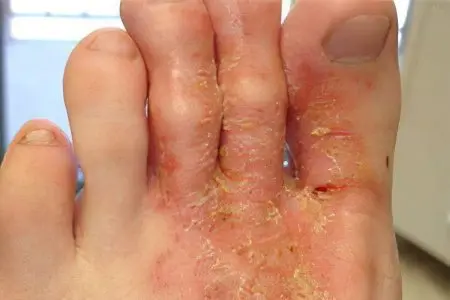Eczema on the legs is a chronic disease that has a neuro-allergic nature, manifests itself in rashes, itching, burning of the lower extremities, and is prone to frequent relapses.
Eczema is widespread, accounting for up to 40% of all dermatitis. The disease affects both women and men with equal frequency. Although some types of dermatological pathology, for example, varicose eczema, are more common in women.
Symptoms of eczema on the legs

The symptoms of eczema on the legs will depend on what type of eczema has affected the lower extremities.
However, the following general symptoms of eczema development can be distinguished, such as:
The appearance of a polymorphic rash, which has a wavy character. Bubbles, nodules, erythema, vesicles, scales, crusts, erosions may appear on the affected areas of the skin. Moreover, all these manifestations can be observed on the lower extremities at the same time.
Erythema, which is expressed in severe reddening of the skin due to dilated capillaries. This process with eczema of the lower extremities is triggered against the background of inflammation, since some mediators contribute to the expansion of blood vessels.
Itching. The skin of the legs is very itchy, as the activity of T-lymphocytes increases. These cells begin to attack both foreign agents and their own body. During this process, a number of biologically active substances are released that provoke itching.
Lichenization of the skin, its dryness and peeling. This symptom occurs during a decrease in inflammation, when scales form on the skin.
Violation of sleep and wakefulness. Often, severe itching, which tends to increase at night, leads to the fact that the patient cannot get enough sleep. Sometimes erosion causes nervous disorders.
Causes of eczema on the legs
The disease has a polyetiological basis, as it develops as a result of the influence of many factors.
Experts identify the following causes of eczema on the legs:
genetic predisposition. It has been established that if one parent had eczema on the legs, then the risk of its development in a child is 40%, and if both parents had a history of the disease, then the risk increases by another 10%. The symptomatology of the disease manifests itself especially clearly in those patients who have intraspecific antigens in the blood – isoantigens A, N, M. In addition, the disease often occurs in people with a positive Rh blood factor.
Violations in the functioning of the endocrine system, in the work of the thyroid gland and adrenal glands.
Violations in the functioning of the central nervous system. In addition to angiovegetative neurosis, patients with eczema on the legs often indicate that the disease arose in them after a stressful situation.
Existing skin diseases: atopic dermatitis, exudative diathesis.
Professional factors, as a result of which various chemicals regularly affect the human body. Exposure to nickel, chromium, lead, manganese, formalin, epoxy resins, cutting fluids, surfactants, etc. can contribute to the formation of occupational eczema. Workers in the pharmaceutical, metallurgical, printing industries, maintenance personnel, car wash workers, etc. are at high risk.
Exposure to the skin of the feet of infectious agents, such as: mycotic microorganisms, bacteria (especially staphylococci and streptococci).
Environmental factors such as: overheating, hypothermia, solar radiation.
Various skin injuries that could be obtained mechanically, chemically or thermally.
Irrational use of certain drugs.
Violation of the digestive tract. It is known that the condition of the skin directly depends on the normal functioning of the digestive organs. If the intestines cannot cope with toxic products that enter it, then most of the harmful substances are absorbed into the blood, in order to then be excreted through the skin. If the problem is not eliminated over a long period of time, then the negative effect of toxic substances on the dermis increases, which leads to the formation of eczema.
If external and internal factors are combined, then the neuro-allergic reaction of the body is formed much faster, as a result, eczema develops.
[Video] Eczema. Causes, symptoms, treatment:









